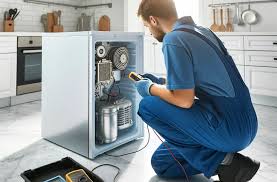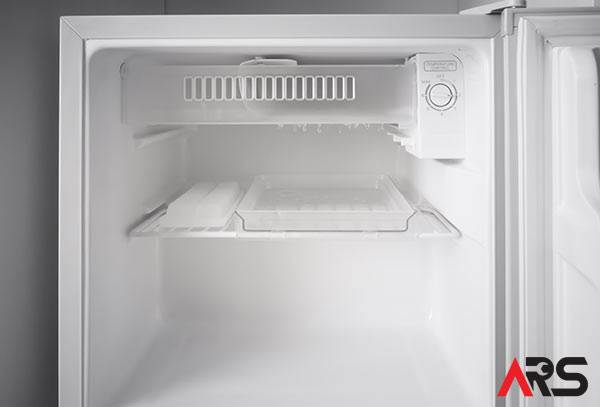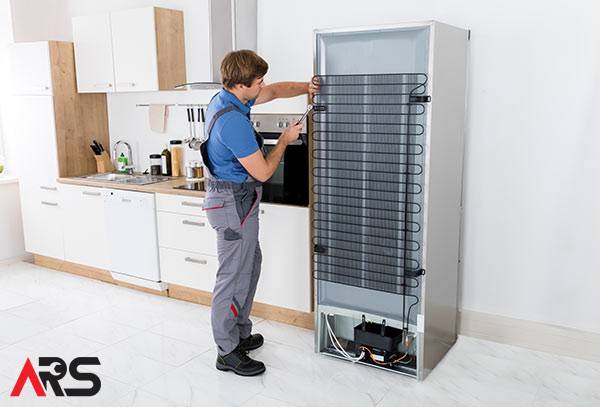
A refrigerator is one of the most essential appliances in any home, quietly running in the background to keep your food fresh. But when it stops working properly, it can cause major disruptions. One critical component that often causes problems is the compressor. In this blog, we’ll dive deep into understanding what a refrigerator compressor is, its purpose, and how to check if it’s working. We’ll also explore the common issues that compressors face, why they can be expensive to repair, and why it’s crucial to have a professional from ARS Appliance Repair Service handle the job.
What is a Refrigerator Compressor?
Understanding the Basics
The refrigerator compressor is often described as the heart of the appliance’s cooling system, and for good reason. Just like the heart pumps blood to circulate oxygen and nutrients throughout the body, the compressor circulates refrigerant through the cooling system, enabling the refrigerator to maintain the desired low temperatures. Without this crucial component, the refrigerator would not be able to perform its primary function—keeping food fresh and safe to eat.
The compressor operates as a motorized pump, which performs a continuous cycle of compressing refrigerant gas, raising its temperature, and then circulating it through the system. The refrigerant, once compressed, becomes a high-pressure gas that flows into the condenser coils located at the back or underneath the refrigerator. As the gas moves through these coils, it cools down and condenses into a liquid form, releasing the heat it absorbed inside the fridge to the surrounding environment.
Once the refrigerant has turned into a liquid, it passes through an expansion valve or capillary tube where its pressure drops, allowing it to evaporate into a gas as it enters the evaporator coils inside the refrigerator. This evaporation process absorbs heat from the refrigerator’s interior, cooling it down. The cycle then repeats as the refrigerant returns to the compressor to be compressed again.
This continuous cycle of compression, condensation, and evaporation is what keeps your refrigerator cold, ensuring that your food remains fresh for longer periods. The compressor’s ability to manage this process efficiently is what determines the overall performance of your refrigerator.
Key Facts About the Compressor
Who Invented the Refrigerator Compressor?
The invention of the refrigerator compressor was a milestone in the history of refrigeration and food preservation. The origins of the compressor can be traced back to the mid-19th century, during the Industrial Revolution, a period of rapid technological advancement.
The first practical vapor-compression refrigeration system was invented by James Harrison, an Australian journalist, and printer, in 1856. Harrison’s journey into refrigeration began somewhat unexpectedly when he observed that ether, a volatile liquid, could be used to produce a cooling effect when compressed and evaporated. Intrigued by this phenomenon, he began experimenting with vapor-compression refrigeration and eventually developed a system that could produce ice and cool storage spaces.
Harrison’s invention laid the groundwork for modern refrigeration technology, allowing for the preservation of perishable food items on a much larger scale than ever before. His system worked by using a compressor to compress refrigerant gas, which was then cooled and condensed into a liquid, much like the systems we use today.
The impact of Harrison’s invention cannot be overstated. Before refrigeration, food preservation relied on methods like salting, smoking, and drying, which were often inadequate for keeping food fresh for extended periods. The development of the refrigerator compressor revolutionized food storage, leading to significant improvements in public health and the global food supply chain.
Over the years, the design and efficiency of compressors have evolved significantly, with advancements in materials, engineering, and environmental considerations leading to the highly efficient, compact, and reliable compressors used in modern refrigerators.
What is the Purpose of a Compressor?
At its core, the compressor’s purpose is to maintain a consistent temperature inside the refrigerator by managing the refrigerant’s state as it cycles through the system. To understand why the compressor is so vital, it’s essential to delve into the refrigeration cycle and how temperature control is achieved.
Refrigerators are designed to maintain a temperature below the ambient room temperature, usually between 35°F (1.6°C) and 38°F (3.3°C) for the fridge compartment and around 0°F (-18°C) for the freezer. This temperature range is critical for slowing down the growth of bacteria and other microorganisms, thereby extending the shelf life of food.
The compressor plays a pivotal role in this process by compressing the refrigerant gas, which increases its temperature and pressure. This high-pressure gas is then cooled in the condenser coils, where it releases the heat it absorbed from the refrigerator’s interior. By controlling the refrigerant’s phase changes (from gas to liquid and back to gas), the compressor regulates the heat exchange process that occurs within the refrigerator.
Without a functioning compressor, the refrigerator would lose its ability to cool, leading to several problems:
- Food Spoilage: Without proper cooling, perishable foods like meat, dairy, and vegetables would spoil quickly, leading to food waste and potential health risks.
- Increased Energy Consumption: A malfunctioning compressor can cause the refrigerator to work harder to maintain the desired temperature, leading to higher energy bills.
- Overheating: If the compressor fails to operate efficiently, it may overheat, causing further damage to the appliance and potentially leading to costly repairs.
The compressor’s ability to maintain consistent and precise temperature control is what makes it indispensable to the refrigerator’s operation. It’s a finely tuned component that must function correctly to ensure the refrigerator’s overall performance and energy efficiency.
What is a Compressor Made Of?
The refrigerator compressor is a complex piece of machinery made up of several key components, each playing a critical role in its operation. Here’s a closer look at what makes up a typical refrigerator compressor:
- Motor: The motor is the driving force behind the compressor’s operation. It powers the pump mechanism, enabling it to compress the refrigerant gas. The motor is typically an electric induction motor, designed to be durable and efficient, capable of running continuously for extended periods.
- Pump: The pump is the heart of the compressor, responsible for compressing the refrigerant gas. It works by drawing in the low-pressure refrigerant gas from the evaporator coils and compressing it to a high-pressure state. The pump is usually a piston or rotary-type mechanism, designed to withstand the high pressures and temperatures involved in the refrigeration process.
- Housing: The compressor’s housing is a sturdy metal casing that encases the motor, pump, and other internal components. The housing serves several purposes:
- Protection: It protects the internal components from external damage and contaminants, ensuring the compressor’s longevity and reliability.
- Noise Reduction: The housing helps to reduce the noise generated by the compressor during operation. Compressors can be quite noisy, and the housing plays a crucial role in minimizing this noise, making the refrigerator more suitable for home use.
- Heat Dissipation: The housing is designed to dissipate the heat generated by the compressor, helping to prevent overheating and ensuring optimal performance.
- Valves and Pistons: Valves and pistons are critical components that control the flow of refrigerant within the compressor. The pistons, driven by the motor, move up and down within the cylinders, compressing the refrigerant gas. Valves open and close to allow the refrigerant to enter and exit the compression chamber at the right times, ensuring a smooth and efficient compression process.
- Oil: Lubrication is essential for the smooth operation of the compressor’s moving parts. The compressor contains a special oil that lubricates the motor, pump, pistons, and other internal components. This oil reduces friction, wear, and tear, extending the compressor’s lifespan and ensuring reliable operation. The type of oil used in compressors is typically a synthetic or mineral oil specifically formulated for refrigeration systems.
- Seals and Gaskets: Seals and gaskets are used throughout the compressor to prevent refrigerant leaks and ensure that the internal components remain sealed and protected. These components are made from materials that can withstand the high pressures and temperatures inside the compressor.
- Electrical Components: The compressor includes various electrical components, such as start relays, capacitors, and overload protectors, which control the motor’s operation and protect the compressor from electrical faults. These components ensure that the compressor starts and runs efficiently, providing reliable cooling performance.
Advanced Compressor Designs
Modern compressors have evolved beyond the basic piston or rotary designs to incorporate advanced technologies that improve efficiency, reduce energy consumption, and minimize environmental impact. Some of these advanced designs include:
- Inverter Compressors: Unlike traditional compressors that operate at a fixed speed, inverter compressors can adjust their speed based on the cooling demand. This allows for more precise temperature control, reduced energy consumption, and quieter operation. Inverter compressors are becoming increasingly common in high-end refrigerators due to their energy-saving benefits.
- Scroll Compressors: Scroll compressors use two interlocking spiral-shaped components to compress the refrigerant. This design is more efficient and reliable than traditional piston compressors, with fewer moving parts and less noise. Scroll compressors are often used in commercial refrigeration systems but are also found in some high-end residential refrigerators.
- Variable Speed Compressors: Variable speed compressors can adjust their speed based on the refrigerator’s cooling needs, similar to inverter compressors. This allows for more efficient operation, particularly in varying temperature conditions. These compressors are designed to operate at lower speeds most of the time, reducing wear and tear and extending the compressor’s lifespan.
- Eco-Friendly Compressors: As environmental concerns have grown, manufacturers have developed compressors that use eco-friendly refrigerants with lower global warming potential (GWP). These compressors are designed to work with newer refrigerants like R600a (isobutane) and R134a, which are less harmful to the environment compared to older refrigerants like R12 and R22.
How to Check If Your Compressor is Working
Step-by-Step Guide
Checking whether your refrigerator’s compressor is working properly can be done with a few tools and some basic knowledge. Here’s a step-by-step guide:
- Listen for Noise: The compressor should make a low humming sound when it’s running. If you hear loud clicking, knocking, or buzzing noises, it might be a sign of a problem.
- Check for Vibration: Place your hand on the compressor’s housing. You should feel a slight vibration if it’s working. If it’s completely still, it might be faulty.
- Measure the Temperature: The compressor should be warm to the touch but not too hot. Overheating can indicate a malfunction.
- Use a Multimeter: To get a more accurate diagnosis, use a multimeter to check the continuity of the compressor’s electrical components. If there’s no continuity, the compressor might be burnt out.
Common Signs of a Faulty Compressor
If your refrigerator isn’t cooling properly, it might be due to a faulty compressor. Here are some common signs that your compressor might be failing:
- Constant Cycling: The compressor turns on and off frequently.
- Overheating: The compressor is hot to the touch.
- No Cooling: The refrigerator isn’t cooling despite the compressor running.
- Unusual Noises: Clicking, buzzing, or knocking sounds coming from the compressor.
Why Are Compressors So Expensive?
The Cost of Complexity
Refrigerator compressors are complex components that require precision engineering. They are built to withstand constant operation and handle the pressure of compressing refrigerant over long periods. This complexity contributes to their high cost. Additionally, compressors are often made from high-quality materials, such as durable metals and specialized lubricants, which further increases their price.
Labor Costs
Replacing a compressor is not a simple task. It involves discharging the refrigerant, removing the old compressor, installing a new one, and recharging the system with refrigerant. This process requires specialized tools and expertise, contributing to the overall cost of repair.
Why You Should Trust ARS Appliance Repair Service
Expertise and Experience
At ARS Appliance Repair Service, our technicians are trained and experienced in handling all types of refrigerator issues, including compressor problems. We understand the intricacies of refrigeration systems and can diagnose and repair issues efficiently and effectively.
Safety and Precision
Working with compressors can be dangerous if not done correctly. Our technicians follow strict safety protocols to ensure that the repair is carried out without any risk of injury or further damage to your appliance.
Warranty and Peace of Mind
When you choose ARS Appliance Repair Service, you’re not just getting a repair; you’re getting peace of mind. We stand by our work and offer warranties on all our repairs, ensuring that your refrigerator is in good hands.
Conclusion
The compressor is a critical component of your refrigerator, responsible for keeping your food fresh and safe. Understanding how to check if your compressor is working can help you catch problems early and prevent costly repairs. However, due to the complexity and potential dangers of working with compressors, it’s always best to trust the experts at ARS Appliance Repair Service. Our team has the skills, tools, and experience to get your refrigerator back up and running in no time. Check out our London and Barrie pages.





